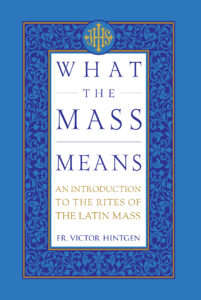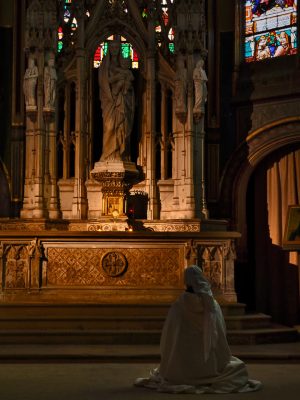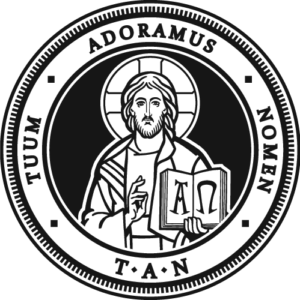Having arranged the chalice for Mass and opened the Missal, the priest descends to the foot of the altar. There he makes the Sign of the Cross with the usual words. It is certainly fitting and wise that the priest and people should begin this Sacrifice with the Sign of the Cross; for the Mass is Christ’s redeeming death on the cross continued and re-presented. The Mass brings us back to the cross on Calvary. The Sign of the Cross is also a synopsis, a summary of our faith. We begin the Mass with a short act of faith in the Trinity and in the Redemption.
Written in Exile
There follows the 42nd Psalm. This inspired poem was written by King David when he was in exile, fleeing from his rebellious son, Absolom. The antiphon is said first, “I will go unto the altar of God. Unto God Who giveth joy to my youth.” The antiphon strikes the key-note of the psalm; it gives the main idea of the poem.
David is in exile. He regrets immensely he is not able to go to the temple and take part in the worship. He longs and yearns to pray and sacrifice in Jerusalem. He begs God to be his judge—a just judge. God knows David is innocent; that his enemies led by the ungrateful Absolom, judge him wrongly. David feels God allows this present revolt as a 6 What the Mass Means punishment for his sins. He begs God to send him help, light and truth, that he may bear his misery humbly. The exiled king hopes in his Creator and promises on his return to the holy city of Jerusalem, to sing the praises of the Lord to the accompaniment of his harp. In the temple he will find joy and gladness. When he offers his sacrifice at the altar, his heart will bound with the joy which was his in youth when he knew no sorrow.
Beautiful Preparation
Isn’t this a beautiful preparation for our Mass? We repeat with the priest this psalm of David. We beg God humbly and contritely to hear our prayers in our extreme need. We, like David, are exiles in this valley of tears. We are troubled with enemies of soul and body. We need strength and light and truth so very badly. God will judge us and we beg Him to be favorable to us. He knows how hard we try to serve Him. Our present sorrows will pass; He will dry the tears from our eyes. We are anxious to offer Him this sacrifice of the Mass. We are happy that we can obtain forgiveness and help at the altar. Our sadness over our helplessness and loneliness turns to thrilling joy as we anticipate the wealth of this Sacrifice of the Mass. Herein we find joy, the only real, lasting and true joy—the joy of youth, the joy of a spiritual new life, in the grace and friendship of God.
Then is said the “Glory be to the Father, etc.” We close this matchless prayer-psalm with a gladsome cry of praise and thanks to each person of the Trinity. During the prayer we bow, to express our reverence and humility before the triune God.
This article is taken from a chapter in What the Mass Means by Fr. Victor Hintgen which is available from TAN Books.





